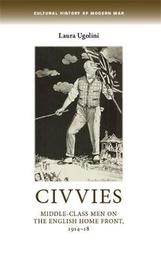
|
Civvies: Middle-Class Men on the English Home Front, 1914-18
Hardback
Main Details
| Title |
Civvies: Middle-Class Men on the English Home Front, 1914-18
|
| Authors and Contributors |
By (author) Laura Ugolini
|
| Series | Cultural History of Modern War |
|---|
| Physical Properties |
| Format:Hardback | | Pages:352 | | Dimensions(mm): Height 216,Width 138 |
|
| Category/Genre | British and Irish History
First world war |
|---|
| ISBN/Barcode |
9780719086014
|
| Classifications | Dewey:940.3161 |
|---|
| Audience | | Professional & Vocational | |
|---|
| Illustrations |
Illustrations, black & white
|
|
Publishing Details |
| Publisher |
Manchester University Press
|
| Imprint |
Manchester University Press
|
| Publication Date |
30 September 2013 |
| Publication Country |
United Kingdom
|
Description
The history of the First World War continues to attract enormous interest. However, most attention remains concentrated on combatants, creating a misleading picture of wartime Britain: one might be forgiven for assuming that by 1918, the country had become virtually denuded of civilian men and particularly of middle-class men who - or so it seems - volunteered en masse in the early months of war. In fact, the majority of middle-class (and other) men did not enlist, but we still know little about their wartime experiences. Civvies thus takes a different approach to the history of the war and focuses on those middle-class English men who did not join up, not because of moral objections to war, but for other (much more common) reasons, notably age, family responsibilities or physical unfitness. In particular, Civvies questions whether, if serviceman were the apex of manliness, were middle-class civilian men inevitably condemned to second-class, 'unmanly' status? -- .
Author Biography
Laura Ugolini is Reader in History at the University of Wolverhampton -- .
ReviewsUgolini clearly identifies the overwhelming importance of the domestic to British masculine identities of the era Laura Ugolini breaks new ground in her book Civvies by examining the experience of English middle-class men who remained at home during the war. -- .
|